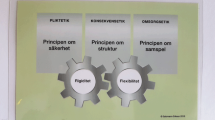Abstract
This paper discusses the application of the guiding ethical principles for the conduct of research involving human subjects in an action research project in a membership-based community psychiatric disability organization. Action research is a collaborative process of critical inquiry between the researcher and the people in the situation, in this case the management executive. The relationship between the researcher and manager participants in a long-term action research project gives rise to ethical dilemmas related to participant selection and voluntary participation, informed consent, decision making, anonymity and confidentiality, conflicting and different needs. The process and strategies implemented to address them are discussed.
Similar content being viewed by others
REFERENCES
Argyris, C., Putman, R., and McLain Smith, D. (1985). Action Science: Concepts, Methods, and Skills for Research and Intervention, Jossey-Bass, San Francisco.
Checkland, P. (1991). From framework through experience to learning: The essential nature of action research. In Nissen, H., Klien, H., and Hirschheim, R. (eds.), Information Systems Research: Contemporary Approaches and Emergent Traditions, Elsevier, Amsterdam.
Churchman, C. W. (1982). Thought and Wisdom, Intersystems Publications, Seaside, CA, pp. 1-10, 116-135.
Commonwealth of Australia (1999). National Statement on Ethical Conduct in Research Involving Humans, Commonwealth of Australia, Canberra.
Cooper, D. R., and Emory, C. W. (1995). Business Research Methods, Irwin, Chicargo.
Ellis, J. H. M., and Kiely, J. A. (2000). Action inquiry strategies: Taking stock and moving forward. J. Appl. Manage. Stud. 9(1), 83-94.
Fairhaven, A. P. L. (1998). Schizophrenia Fellowship of Victoria-Organizational Review, Schizophrenia Fellowship of Victoria, Melbourne.
Flood, R. L. (1990). Liberating Systems Theory, Plenum, New York and London.
Flood, R. L. (1995). Solving Problem Solving: A Potent Force for Effective Management, Wiley, Chichester, England.
Flood, R. L. (1999). Rethinking the Fifth Discipline: Learning Within the Unknowable, Routledge, London.
Flood, R. L. (2001). The relationship of ‘systems thinking’ to action research. In Reason, P., and Bradbury, H. (eds.), Handbook of Action Research: Participative Inquiry and Practice, Sage, London, pp. 133-155.
Flood, R. L., and Carson, E. R. (1993). Dealing With Complexity: An Introduction to Theory and Application of System Science, Plenum, New York.
Flood, R. L., and Jackson, M. C. (1991a). Creative Problem Solving: Total Systems Intervention, Wiley, Chichester, England.
Flood, R. L., and Jackson, M. C. (1991b). Critical Systems Thinking: Directed Readings, Wiley, Chichester, England.
Group (2000a). Notes on meeting with executive managers, May 22, 2000. B. C. Walker. Melbourne.
Group (2000b). Notes on meeting with executive managers, May 8, 2000. B. C. Walker. Melbourne.
Lincoln, Y. S. (2001). Engaging sympathies: Relationships between action research and social constructivism. In Reason, P., and Bradbury, H. (eds.), Handbook of Action Research: Participative Inquiry and Practice, Sage, London, pp. 124-132.
Marshak, R. J. (1993). Lewin meets Confucius: A review of the OD model of change. J. Appl. Behav. Sci. 29(4), 393-415.
Nakkula, M. J., and Ravitch, S. M. (1998). Matters of Interpretation: Reciprocal Transformation in Therapeutic and Developmental Relationships With Youth, Jossey-Bass, San Francisco.
Payne, S. L. (2000). Challenges for research ethics and moral knowledge construction in the applied social sciences. J. Bus. Eth. 26, 302-318.
Plane, J. P. (2000). The ethnomethodological approach of management: A new perspective in constructivist research. J. Bus. Eth. 26, 233-243.
Reason, P., and Bradbury, H. (eds.) (2001). Handbook of Action Research: Participative Inquiry and Practice, Sage, London.
Schein, E. H. (2001). Clinical inquiry/research. In Reason, P., and Bradbury, H. (eds.), Handbook of Action Research: Participative Inquiry and Practice, Sage, London, pp. 228-237.
SFV (2000). SFV: Strategic Framework, SFV, Melbourne, pp. 1-6.
Sieber, J. E. (1992). Planning Ethically Responsible Research: A Guide for Students and Internal Review Boards, Sage, Newbury Park.
Singer, P. (1995). How Are We to Live?: Ethics in an Age of Self Interest, Reed Book, Australia.
Spradley, J. P. (1980). Participant Observation, Harcourt Brace Jovanovich, Orlando, FL.
Stringer, E. T. (1996). Action Research: A Handbook for Practitioners, Sage, Thousand Oaks.
Walker, B. C. (2000). Impact of a strategic change in a membership organization: Explanatory statement. Melbourne 1-2.
Wells, V. J. (1994). Ethics in business management research. In Wass, V. J., and Wells, W. P. E. (eds.), Principles and Practice in Business Management Research, Aldershot, Hants, England. pp. 277-297.
Author information
Authors and Affiliations
Rights and permissions
About this article
Cite this article
Walker, B., Haslett, T. Action Research in Management—Ethical Dilemmas. Systemic Practice and Action Research 15, 523–533 (2002). https://doi.org/10.1023/A:1021016821198
Issue Date:
DOI: https://doi.org/10.1023/A:1021016821198




